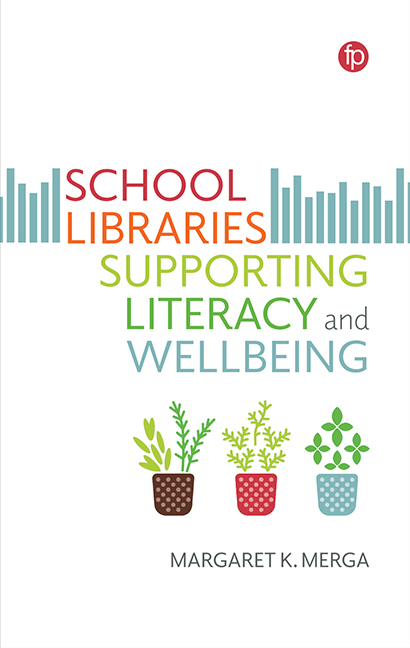Book contents
- Frontmatter
- Contents
- List of Tables
- Acknowledgements
- Abbreviations
- Introduction
- 1 What Do School Library Professionals Contribute to Student Learning and Support? A Focus on Australia and the UK
- 2 School Libraries and Reading Engagement for Literacy
- 3 Librarians Supporting Struggling Literacy Learners Beyond the Early Years
- 4 School Libraries and Reading Engagement for Student Wellbeing
- 5 School Libraries, Health Resourcing and Information Literacy
- 6 Librarians Creating Environments for Reading and Wellbeing
- 7 Challenges to Visibility and Advocacy for School Libraries and Staff
- Conclusions and Directions for Future Research
- Appendix 1 Background and Methods of My Research Projects
- Appendix 2 A Place to Get Away from It All: Five Ways School Libraries Support Student Wellbeing
- Index
5 - School Libraries, Health Resourcing and Information Literacy
Published online by Cambridge University Press: 21 April 2022
- Frontmatter
- Contents
- List of Tables
- Acknowledgements
- Abbreviations
- Introduction
- 1 What Do School Library Professionals Contribute to Student Learning and Support? A Focus on Australia and the UK
- 2 School Libraries and Reading Engagement for Literacy
- 3 Librarians Supporting Struggling Literacy Learners Beyond the Early Years
- 4 School Libraries and Reading Engagement for Student Wellbeing
- 5 School Libraries, Health Resourcing and Information Literacy
- 6 Librarians Creating Environments for Reading and Wellbeing
- 7 Challenges to Visibility and Advocacy for School Libraries and Staff
- Conclusions and Directions for Future Research
- Appendix 1 Background and Methods of My Research Projects
- Appendix 2 A Place to Get Away from It All: Five Ways School Libraries Support Student Wellbeing
- Index
Summary
When we think about school libraries fostering young people's wellbeing, we should take into account the fact that library professionals, regardless of the setting, are passionate about connecting their clients to current and important information. Some of that information will be health information that supports students’ capacity to understand and be responsive to issues impacting on their wellbeing, such as information about health conditions in themselves and others. Providing young people with access to current health information and teaching them the skills they need to individually source it and determine its credibility are key affordances of the contemporary school library that may be lost if we do not value them, given the diverse roles that our libraries play in students’ lives. However, given schools’ increasing interests in fostering digital and information literacy in their students to the extent that, in some cases, such instruction has been mandated as an educational requirement (Phillips & Lee, 2019), this may perhaps be an aspect of the school library professionals’ roles likely to garner increasing attention.
While information literacy is conceptualised in various ways, as noted by McKeever et al. (2017), these definitions ‘revolve around the same ideas of being able to access, use and communicate information effectively’ (p. 51), and Fadhli (2021) links information literacy skills to an individual's capacity for lifelong learning. For at least the past 50 years, library professionals have taken responsibility for connecting their clients with the largest body of information possible (Thomas et al., 2011). It is part of the core role of school library professionals to support information skills in both staff and students. In the US, the school library is expected to increasingly adopt ‘a proactive role in student learning as today's information and technology environment becomes an integral and natural part of life’ (American Association of School Librarians (AASL), 2013, p. 1), and the AASL's National School Library Standards (2018) detail the role of the school librarian and library in supporting information literacy, primarily in relation to inquiry-based learning. In the UK, job description documents (JDFs) commonly expected school librarians to facilitate information literacy (Merga, 2020a), and in 2011, Streatfield et al.
- Type
- Chapter
- Information
- School Libraries Supporting Literacy and Wellbeing , pp. 101 - 116Publisher: FacetPrint publication year: 2022

